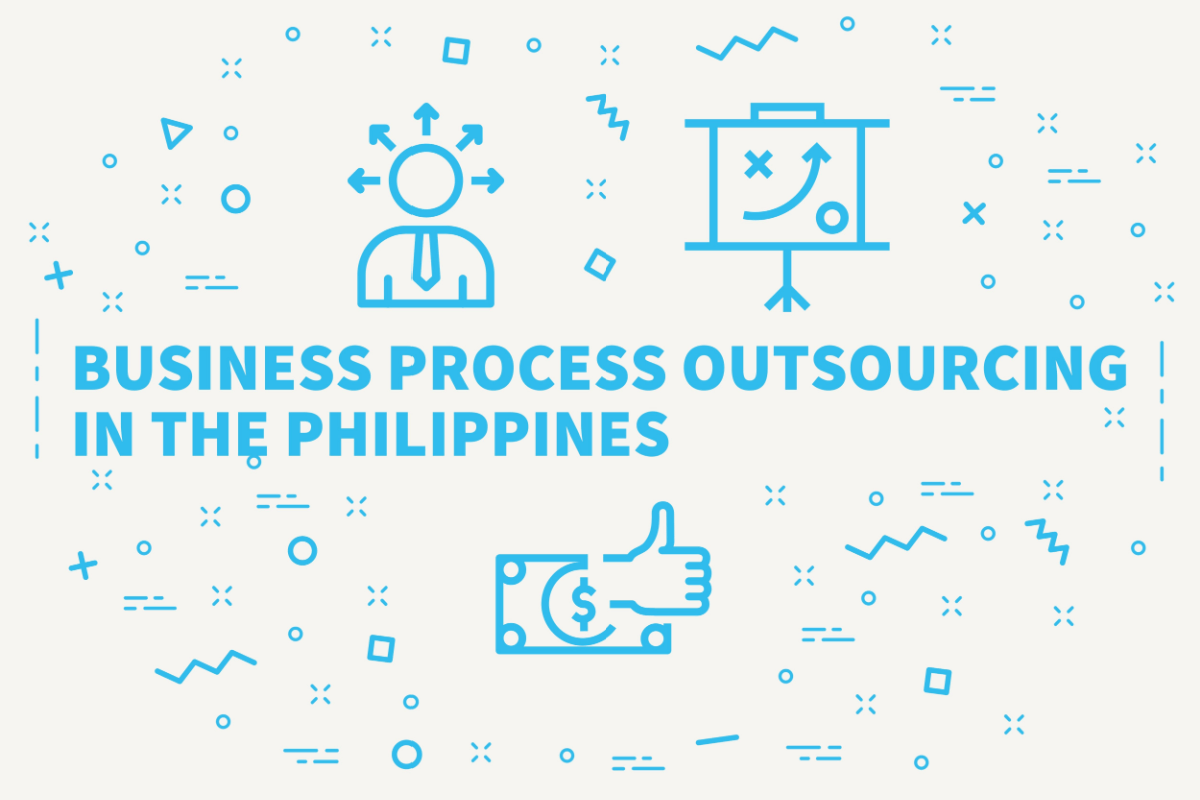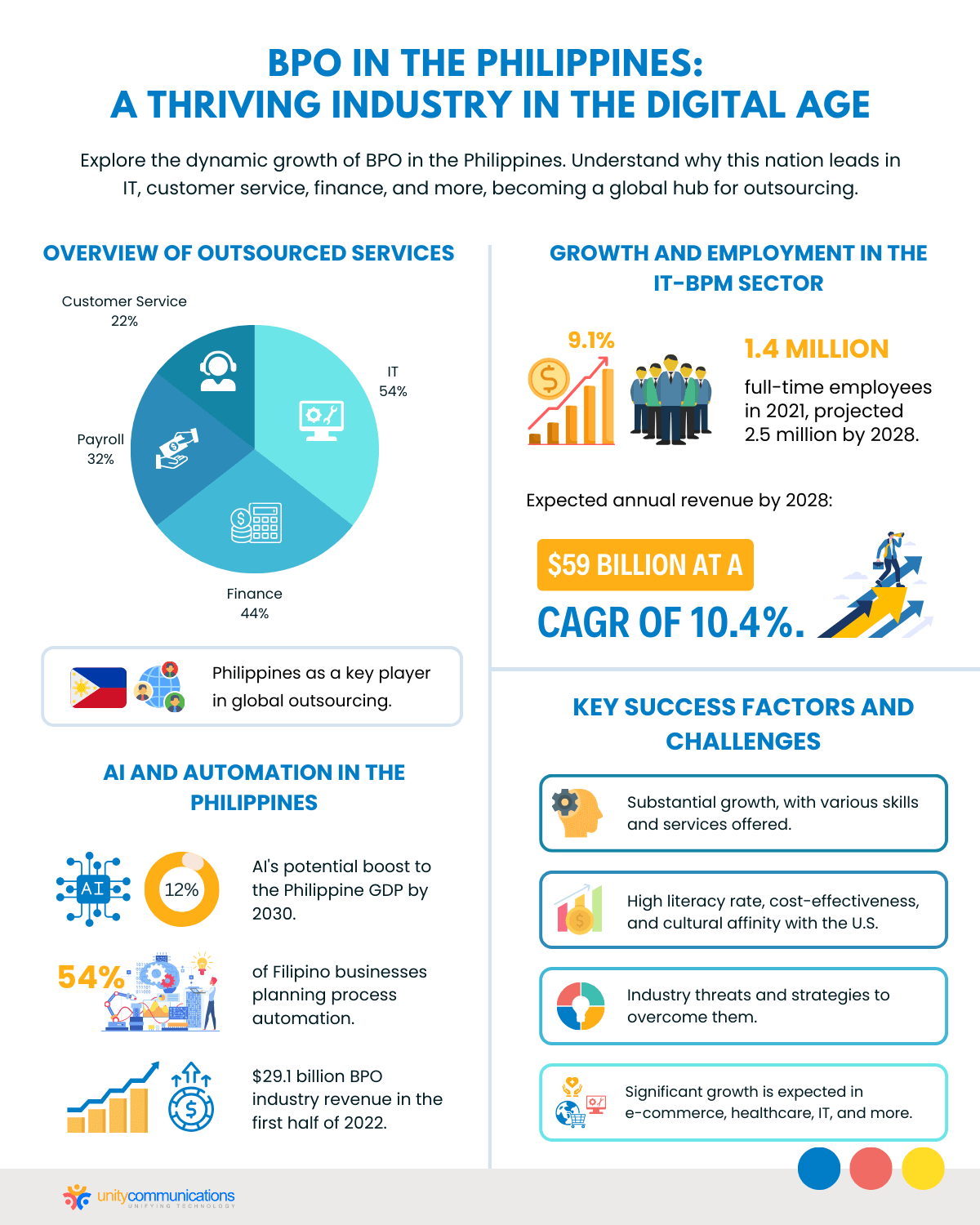Table of Contents
Companies might struggle to reduce costs, focus on core functions, and overcome talent shortages. Hence, they should look into business process outsourcing (BPO) to address these pain points.
One of the world’s top offshoring providers is the Philippines. It is a popular outsourcing destination for its high literacy rate, culture, specialized talent pool, and cost-effectiveness.
The country’s BPO industry also demonstrated continued operations and growth despite experiencing hurdles in the previous years. As such, many companies’ top consideration is to outsource to the Philippines.
Read on to learn more about the Philippine BPO industry.
Status of the Philippine BPO Industry

The Philippine business process outsourcing industry started by providing low-end services with a single focus. But over the years, it has grown into a large sector offering a wide range of skills and services for clients worldwide.
Since its inception, the Philippine BPO industry has gained significant traction in the global market. This growth is due to companies’ growing need to concentrate on their core business activities, reduce costs, and address issues such as a shortage of skilled talent.
A 2021 report from Deloitte showed that the most commonly outsourced services in the world are information technology (IT) at 54%, finance (44%), payroll (32%), and customer service (22%). While India is the global leader in outsourcing services, the Philippines closely follows behind.
India is known for its impressive IT skills and infrastructure. Meanwhile, the greatest advantages of the Philippines are its customer service agents’ soft skills and high English proficiency. Its strong cultural affinity with the U.S. makes the country a force to be reckoned with in the outsourcing industry.
BPO Companies Adopt 100% Telecommuting and Still Enjoy Tax Incentives
On September 24, 2022, the Philippine Fiscal Incentives Review Board (FIRB) allowed IT business process outsourcing or business process management (IT-BPO/BPM) companies in ecozones to embrace a 100% remote setup without losing their tax incentives.
According to FIRB, IT-BPO/BPM firms must shift their registrations from the Philippine Economic Zone Authority (PEZA) to the Board of Investments (BOI) to qualify for a fully remote setup. Transfers are processed quickly and efficiently to ensure companies can enjoy tax benefits.
IT-BPM companies have the Department of Trade and Industry (DTI) to thank for this arrangement. It shows the government’s appreciation for the BPO industry’s role in giving Filipinos jobs and bringing in foreign investments.
IT-BPO Sector Is the Largest Employer in the Philippines
In 2021, the IT-BPM sector grew by 9.1% after hiring 120,000 full-time employees (FTEs) year on year. This brought the total number of IT workers in the Philippines to 1.4 million, contributing to the country’s continued economic recovery post-pandemic.
The sector also expects to add up to 1 million direct jobs in the next six years, potentially bringing the industry’s total headcount to nearly 2.5 million by 2028. It is forecasted to have an 8.5% growth rate.
The BPO industry in the Philippines aims to grow even further by hiring people from outside Manila, the country’s capital. More than half the one million job targets are in the provinces.
The outsourced tech solutions market could also nearly double in size by 2028. Its annual revenue is expected to reach $59 billion at a compound annual growth rate (CAGR) of 10.4%.
Philippine BPO To Continue AI Automation
The Philippines remains an attractive option to businesses because of its affordable labor costs. But apart from cost savings, businesses today also prioritize implementing digital transformation, increasing production efficiency, and integrating strategies to help them adapt to change quickly and efficiently.
Back-office outsourcing to the Philippines is an excellent way for organizations to complete their staffing requirements and keep up with transformational strategies, especially with artificial intelligence (AI) on the rise.
Kearney, a global management consulting agency, says that AI is expected to boost the gross domestic product (GDP) of Southeast Asian countries by 10% to 18% by 2030. In the Philippines, it is expected to boost the economy by 12% of the GDP by 2030.
The same report cites the following data:
- 54% of Filipino businesses are planning to integrate process automation
- 26% of businesses in the Philippines are keen to develop and invest in an AI strategy
- 9% of companies have scaled end-to-end AI implementation
- 4% are scaling across industries
A Bright Future Lies Ahead for the BPO Sector
According to the IT and Business Process Association of the Philippines (IBPAP), the Philippine BPO industry has 1.4 million FTEs. The industry also generated $29.1 billion in revenue during the first half of 2022, which can be due to the growth in e-commerce, healthcare, financial technology, and IT.
In addition, there is greater demand for outsourced services from clients around the world. BPO and contact center clients have grown to trust work-from-home (WFH) arrangements as well. Both of these factors contribute to the industry’s growth.
The BPO industry played a crucial role in the Philippine economy’s recovery. Although the pandemic adversely affected BPO companies, they managed to adjust quickly and invest in infrastructure that allowed them to keep operations running.
IBPAP said that the industry’s fast recovery would continue to increase the demand for IT-BPM services. Higher demand will help drive investment, prevent job loss, increase real estate opportunities, and develop the countryside.
What Makes the Philippines a Top BPO Provider?

To qualify as a top BPO provider, the Philippines is ranked across three factors: labor, cost, and regulations. These three parameters determine the country’s competitiveness and sustainability as an outsourcing destination.
- Regulations. Businesses assess the country’s minimum capital requirement, business regulations, and tax-payment procedures.
- Cost. Companies review factors such as wages and infrastructure costs, including fit-out expenses and office rental.
- Labor. Decision-makers assess the availability of employees in the country. It also looks at the quality of their talent and the depth of their professional and technical skills.
The Philippines is a top-tier destination for data entry services and voice-related functions. Its ability to offer non-voice IT services and BPM to clients worldwide is also growing quickly.
Excellent infrastructure, scalable talent, adequate support from the government, and a proven track record are other factors affecting the country’s success in BPO.
The Philippines also has favorable tax laws, helping the BPO industry gain global clients. The government established PEZA to help companies, including BPO providers, get tax exemptions.
Services eligible for PEZA registration include technical support outsourcing, software development, back-office solutions, and more.
What Services Does the Philippine BPO Industry Offer?
The Philippine BPO industry offers several types of outsourced services. Service providers typically focus on back-office functions such as human resources (HR), IT, and finance. But front-office activities, such as contact center as a service (CCaaS) and customer support, are also available.
Additionally, businesses commonly outsource the following processes:
- Transcription
- Data mining and input
- Animation services
- Game development
- Software development
These processes need a big labor investment, but workers need not be present on-site. Hence, companies outsource these services to the Philippines.
Threats to the Philippine BPO Industry

The Philippine BPO industry has a bright future if it maintains good standing. But we must keep a close watch on threats that can prevent its success.
- Automation. Service automation is one of the threats awaiting BPO companies. Businesses might take the AI route since it is cheaper than recruiting human staff. But this decision has pros and cons. While AI is faster and cheaper, it cannot replace the empathy and versatility that human experts offer.
- Technical issues. Remote work is more likely to be disrupted by technical issues, with the loss of internet connectivity as a typical example. Unless contractors have stable Wi-Fi, working from home might not be as efficient as working on-site.
- Skill shortage. BPO companies receive thousands of applications yearly, but only a select few pass the recruitment process due to a lack of skills. The outsourcing sector is vulnerable to this issue, especially now that technology is developing faster than expected.
Ways to Beat BPO Threats
With the rise of new technologies, top outsourcing providers in the Philippines strive to gain an edge in the industry. Some turn to knowledge process outsourcing (KPO) to respond to AI threats.
In addition to English proficiency, Filipino workers possess analytical and creative skills. They are no longer restricted to being good English speakers. They display great knowledge and expertise, making them valuable assets for your business.
Top BPO companies in the Philippines now offer KPO services such as professional consulting, creative design, web development, research, and digital marketing. Outsourcing options grow with more digital innovations.
The Bottom Line

The Philippines is one of the top destinations for outsourced services worldwide. Due to excellent infrastructure, favorable tax laws, and adequate government support, it remains the leading choice for many businesses.
The country now allows BPO firms to operate 100% remotely without losing tax benefits. The IT-BPO sector is the largest employer in the nation, with 1.44 million workers. It is also projected to produce up to 1.1 million direct jobs in the next six years.
The Philippines continues to support the needs of BPO firms. Meanwhile, the country bolsters its economy through foreign direct investments. It creates laws to further incentivize foreign investors, thus asserting its reputation as an ideal investment hub.




